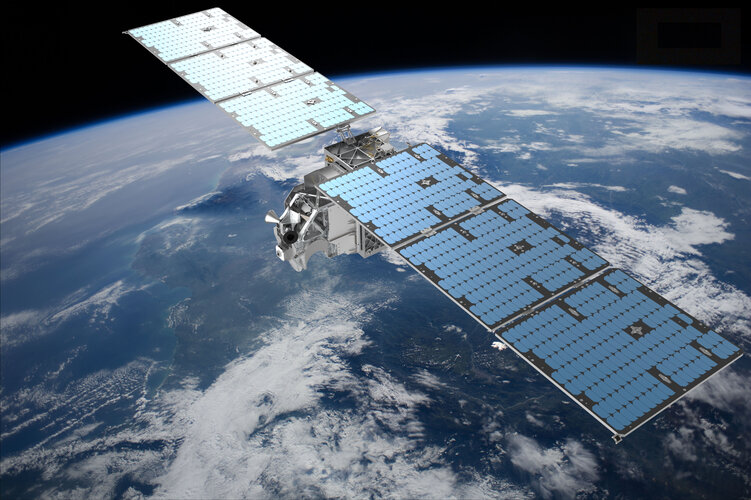ESA's Arctic Weather Satellite is a prototype mission that aims to improve weather forecasts in the Arctic – a region that currently lacks data for accurate short-term forecasts.
The satellite will build on existing Arctic monitoring satellites and will provide precise, short-term weather forecasts for the Arctic region. It is equipped with a 19-channel cross-track scanning microwave radiometer which will provide high-resolution humidity and temperature soundings of the atmosphere in all weather conditions.
The Arctic Weather Satellite is the forerunner of a potential constellation of satellites, called EPS-Sterna, that ESA would build for Eumetsat if the first prototype Arctic Weather Satellite performs well.
The constellation would supply an almost constant stream of temperature and humidity data from every location on Earth. This would, for the first time, allow for very short-range weather forecasting, or ‘nowcasting’, in the Arctic. Meteorologists would use the mission to improve weather forecasts around the world.
The Arctic Weather Satellite mission will support research into climate change. Climate change is occurring at a faster pace in the Arctic compared to other parts of the world and these rapid changes are affecting the Earth system as a whole.
Embracing the concept of New Space, the Arctic Weather Satellite was developed and built on a very tight schedule. It took just 36 months from ESA awarding the industrial prime contract to OHB in Sweden to the satellite being completed.
From OHB's premises in Sweden, the satellite will be shipped to SpaceX’s launch site in Vandenberg, California, in April. The satellite is scheduled to launch on a rideshare mission no earlier than June 2024.
Programme
The schedule of the event is planned as follows:
11:45 – 12:30 Check-in and lunch
12:30 Opening of Arctic Weather Satellite send-off event
- Welcoming words, OHB Sweden
- Mats Persson, Swedish Minister for Education
- Romina Pourmokhtari, Swedish Minister for Climate and the Environment
- Josef Aschbacher, Director General, ESA
- Joakim Kugelberg, Arctic Weather Satellite Project Manager OHB Sweden, and Ville Tuomas Kangas, Arctic Weather Satellite Project Manager ESA
- Anna Rathsman, Director General, Swedish National Space Agency
- Christian Bank, EUMETSAT Director Programme Preparation and Development
- Wrap-up of speaker session, OHB Sweden
13:30 – 14:00 Q&A session with Subject Matter Experts
14:00 – 16:00 Cleanroom tour and interview opportunities
16:00 End of programme
Participants include:
- Simonetta Cheli, Director of Earth Observation Programmes, ESA
- Dominique Gillieron, Head of Earth Observation Projects Department, ESA
- Graeme Mason, Meteorological Programmes Manager, ESA
Accreditation
Media representatives are invited to register by Thursday 28 March by selecting and completing the relevant form at https://blogs.esa.int/forms/esa-media-briefing-form
In case of questions please contact (+46 73-2038610) or .
OHB Sweden, Viderögatan 6, 164 40 Kista, Sweden
Travel costs for media representatives will not be covered.
Further information
Arctic Weather Satellite background info and latest news: https://www.esa.int/Applications/Observing_the_Earth/Meteorological_missions/Arctic_Weather_Satellite
More information about ESA Earth observation programmes: https://www.esa.int/Applications/Observing_the_Earth
More information about ESA: www.esa.int
Images
https://www.esa.int/ESA_Multimedia/Missions/Arctic_Weather_Satellite/(result_type)/images
https://www.esa.int/ESA_Multimedia/Directorates/Observing_the_Earth/(result_type)/images
Terms and conditions for using ESA images:
https://www.esa.int/ESA_Multimedia/Terms_and_conditions_of_use_of_images_and_videos_available_on_the_esa_website
For questions or more information related to ESA images, please contact directly .
Videos
https://www.esa.int/ESA_Multimedia/Videos/2024/03/Arctic_Weather_Satellite
https://www.esa.int/Applications/Observing_the_Earth/(archive)/0/(type)/video
https://www.esa.int/esatv/Videos_for_Professionals
Terms and conditions for using ESA videos:
https://www.esa.int/ESA_Multimedia/Terms_and_conditions_of_use_of_images_and_videos_available_on_the_esa_website
For questions or more information related to ESA videos, please contact directly .
Social Media
Follow ESA on:
X: @esa@ESA_EO
Instagram: @europeanspaceagency@ESA_Earth
Facebook: EuropeanSpaceAgency
YouTube: ESA
LinkedIn: European Space Agency - ESA
Pinterest: European Space Agency - ESA
About the European Space Agency
The European Space Agency (ESA) provides Europe’s gateway to space.
ESA is an intergovernmental organisation, created in 1975, with the mission to shape the development of Europe’s space capability and ensure that investment in space delivers benefits to the citizens of Europe and the world.
ESA has 22 Member States: Austria, Belgium, the Czech Republic, Denmark, Estonia, Finland, France, Germany, Greece, Hungary, Ireland, Italy, Luxembourg, the Netherlands, Norway, Poland, Portugal, Romania, Spain, Sweden, Switzerland and the United Kingdom. Latvia, Lithuania, Slovakia and Slovenia are Associate Members.
ESA has established formal cooperation with four Member States of the EU. Canada takes part in some ESA programmes under a Cooperation Agreement.
By coordinating the financial and intellectual resources of its members, ESA can undertake programmes and activities far beyond the scope of any single European country. It is working in particular with the EU on implementing the Galileo and Copernicus programmes as well as with Eumetsat for the development of meteorological missions.
Learn more about ESA at www.esa.int



